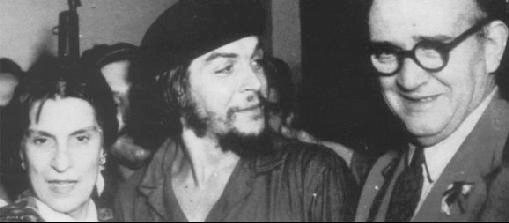Co-editors: Seán Mac Mathúna • John Heathcote
Consulting editor: Themistocles Hoetis
Field Correspondent: Allen Houglande-mail: thefantompowa@fantompowa.org
Che
Guevara: Internet Sites on the Man of the
Century Recently on a visit to Galway l
noticed down by the famous Spanish Arch by the harbour, a
small monument had been put up to commemorate Christopher
Columbus - a man with no connection whatsoever with Galway.
l found it offensive that Galway City Council had decided,
shamefully, to recognise a man who had helped start the
genocide of indigenous peoples throughout the America's in
1492. l wondered why there was no memorial anyway to one of
Galway's most famous son's, Ernesto "Che" Guevara Lynch
(1928-1967), perhaps one of the world's most famous
revolutionaries, and at least connected to the town through
his surname - the Lynch family were one of the famous 14
Tribes of Galway. Che's father's surname, Lynch,
is one of the most common throughout Ireland. It is unusual
in that it has two completely distinct origins. The first is
Norman, from de Lench, possibly derived from a place
now forgotten. The family settled initially in County Meath
and a branch then established itself in Galway, and became
known as one of the Tribes of Galway. The Gaelic origin for
the name is from the Irish O Loinsigh, from
Loinseach, meaning 'Seaman'. This arose quite
separately in a number of areas, including Clare/Limerick,
Sligo, West Cork, Cavan, Donegal and the north Antrim/Derry
region, where they were chiefs of the old kingdom of Dal
Riada (originally from Munster) until medieval times.
Most people seem to accept that
Che's grandmother, Anna Isabel Lynch, was born in the west
of Co. Galway and eventually she moved to South America.
Once there she met a man called Guevara, and they had a
child they named Ernesto who was Che's father. On 29th August 1999, the
historian Peter Berresford Ellis talked of Che's Irish roots
in a lecture given at the Desmond Greaves Summer School.
Apparently, Che was not only aware of his family background
in Ireland and his families roots in Co. Cork, but that he
was "deeply fascinated by the history of Ireland", according
to Berresford Ellis, who had met Che's father, Ernesto
Lynch. Furthermore, Che was but one of many descendants of
the Irish Diaspora in Latin America that played a
significant part in revolutions and social change that swept
the America's former Spanish colonies. An
Phoblacht/Republican News
published an extensive review of the role of the Irish
Diaspora (including that of Che Guevara) in the history of
Latin America by Berresford Ellis on 30th September
1999. On March 13th 1965, the Irish
Times journalist Arthur
Quinlan interviewed
Che at Shannon Airport during a stopover flight from Prague
to Cuba. Guevara talked of his Irish connections through the
name Lynch. He told Quinlan of his Grandmothers Irish roots
in Galway. Later, Che, and some of his Cuban comrades, went
to Limerick City and adjourned to the Hanratty's Hotel on
Glentworth Street. According to Quinlan, they returned that
evening all wearing sprigs of Shamrock, for Shannon and
Limerick were preparing for the St. Patrick's Day
celebrations. Another journalist in Co.
Clare, Joe O'Muircheartaigh has written on the Irish roots
of Che Guevara. He said how his father, Ernest Guevara
Lynch, had put the revolutionary instincts which led Che to
Cuba, the Congo and ultimately to death in Bolivia, down to
his Irish ancestry. "The first thing to note is that in my
son's veins flowed the blood of the Irish rebels", he said
in a 1969 interview. He went on: "Che inherited some of the
features of our restless ancestors. There was something in
his nature which drew him to distant wandering, dangerous
adventures and new ideas". According to O'Muircheartaigh,
Guevara's Irish links can be traced to Galway and one
Patricio Lynch, the founder of the Argentine branch of his
family, was said to be born in Galway in 1715. From there he
spent some time in Spain before eventually settling in
Argentina. The Lynch name has been there ever since.
O'Muircheartaigh speculates that Che's came from the Kilkee
area of West Clare. It is also claimed - although no
evidence has been found - that Guevara had visited Kilkee as
a young man - in his pre revolutionary days - in the company
of his mother and spent some time in the old Victoria
Hotel. As for the surname
Guevara,
it is believed to be of Basque origin, and is derived from
the place name Guevara which is located in the Basque
province of Alava.
According to etymologists, the place name Guevara is derived
from the Basque word "ebar" which means "fern or bracken".
The earliest record of the surname is that of a donation
made to the Order of Calatrava by Vela Ladron de Guevara in
1288. He was a descendant of Count Ladron Velez de Guevara,
Senor of the House of Guevara, who described himself as a
"Prince of the people of Navarre". Whether or not his
great-grandmother or grandmother was born in Ireland, it is
time that Che Guevara was recognised by the Irish nation
(along with John Lennon) as one of it's most famous
sons. © 2000

Che
pictured here with his parents. His father Ernesto
Guevara said in 1969: "The first thing to note is
that in my son's veins flowed the blood of the Irish
rebels"